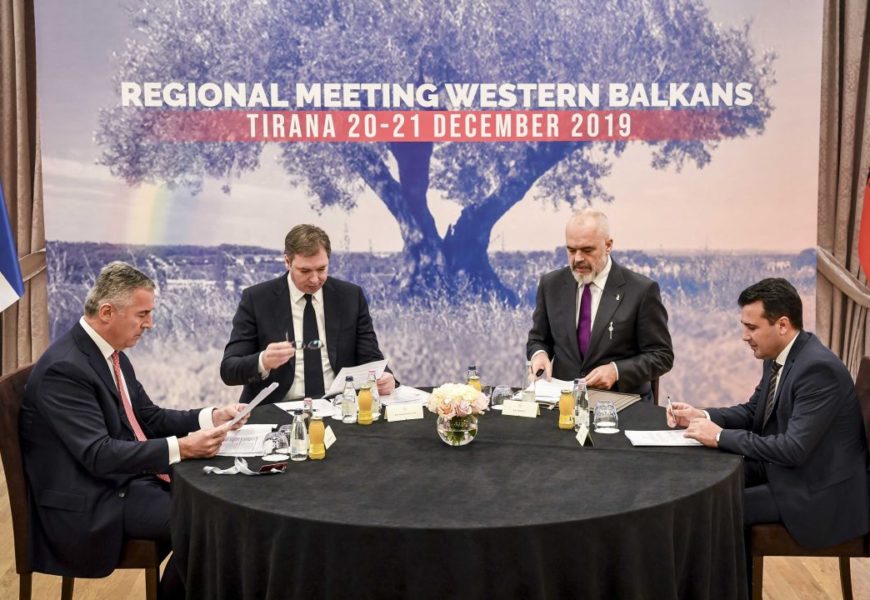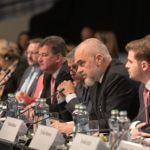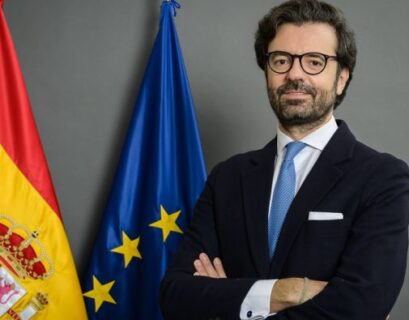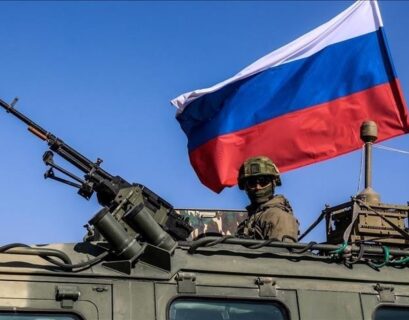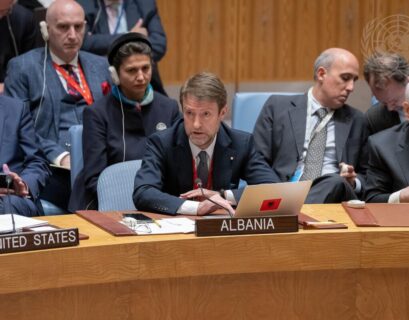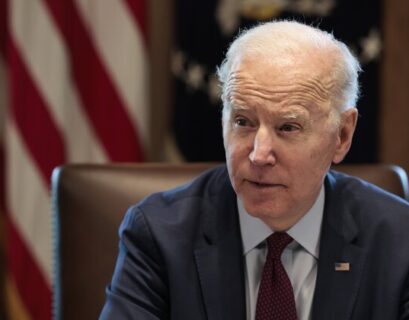AGON DEMJAHA
Introduction
Although countries of the Western Balkans have made full integration into the European Union one of their key strategic priorities, mainly due to bloody wars that followed the disintegration of former Yugoslavia, the process of integration of these countries came with certain delay as compared to the rest of the European post-communist states. While in Central and Eastern Europe, the phases of stabilisation, transition and integration basically followed one another, in the Western Balkans the EU integration was a condition of stabilisation, rather than the other way around.[1] As a result, the EU has in addition to the Copenhagen principles and universal Western criteria for the Western Balkans adopted regional cooperation and good neighbourly relations as an additional cluster of accession criteria. After the Kosovo war in 1999, the EU has introduced a more comprehensive and positive-looking regional approach through the Stabilisation and Association Process for the Western Balkans and the regional Stability Pact for South-Eastern Europe.[2] For countries of the region, the Stabilisation and Association Agreements clearly stipulated the importance of regional cooperation and good neighbourly relations as central to their path towards the EU. The Stability Pact, on the other hand, was given unique powers to convene representatives of SEE and the international community to work on regional co-operation strategies in different areas such as democracy, economy and security.[3] Clearly, for EU the development of regional cooperation represented a key factor for establishing political stability, security and economic prosperity in the region. Through both these mechanisms, the EU has significantly contributed to increased sensitivity for the regional issues and problems among countries in the region. As a result, it is not surprising that until recently the majority of regional organisations and initiatives that emerged throughout the region have been initiated and driven by the EU.
With the beginning of the Berlin Process in 2014 and especially after the Trieste Summit in 2017, the notion of regional cooperation in the Western Balkans was raised to another level. Concrete measures were introduced in the fields of infrastructure, trade, investment, mobility and digitalization, and so forth.[4] The EU Strategy “A Credible Enlargement Perspective for an Enhanced EU Engagement with the Western Balkans” has in February 2018 also reflected on the project of building a common market and integrated region in the Balkans. When in October 2019 the bids of Albania and North Macedonia to start the EU accession negotiations were blocked by France and some other EU members, the leaders of Serbia, Albania and North Macedonia decided to initiate the creation of their own free transit area. Such area, often-nicknamed “mini-Schengen” after the EU’s borderless zone, is supposed to guarantee the freedom of movement of goods, services, people and capital in the region. The leaders reiterated that full and free movement of goods, services, capital and labour throughout the entire region represent the best way for a small region like Western Balkans to generate growth in an increasingly changing and globalized economy.[5] Nevertheless, while the European Union and the US have welcomed this initiative, in the region itself such idea has from the beginning deeply divided the public opinion with many voices pro and against it. The aim of this paper is to dwell on the necessity, feasibility and impact of this new regional platform, while at the same time analysing pros and cons of such initiative.
Current State of Affairs
When it was launched by German Chancellor Angela Merkel in 2014, the Berlin Process was promoted as an ad-hoc high-level initiative that aimed at overcoming the fatigue of enlargement in a time of crisis of relations between the European Union and Western Balkans. In this context, it aimed at intensifying and facilitating regional cooperation among six Western Balkan (WB6) countries through active multi-frontal engagement.[6] In its attempt to revitalise the accession process of the WB6, the Berlin Process placed great emphasis on increasing connections and cooperation between countries in the region. By promoting more connectivity between the Western Balkan countries, the process at the same time was trying to achieve something that the EU has long sought from the Western Balkans countries – their cooperation without the EU oversight. As already mentioned, almost all earlier regional organisations and initiatives in the region were initiated and driven by the EU. For a long period, the perception was that if left on their own, the Western Balkan countries would remain isolated from each other and might potentially even fall back into conflict.[7] As a result, as envisaged by the Multi-annual Action Plan adopted at the Summit of the Western Balkans Prime Ministers in Trieste in July 2017, as part of the Berlin Process, the WB6 have initiated the process of the establishment of the Regional Economic Area (REA).[8]
Nevertheless, it took some time before any significant progress in this direction was made, mainly due to continued political disagreements. When at a Brussels summit in October 2019, French President Macron vetoed the opening of accession negotiations with North Macedonia and Albania, the idea began to materialize. Such decision was afterwards followed by a two-and-a-half page “non-paper” that called for changes in the current accession process to the EU. The document proposes a new seven-stage process with “stringent conditions in order to effectively converge towards European norms and standards,” as well as a “reversibility” component that would allow the EU to abandon membership talks if a candidate country’s government backslides away from the bloc’s standards.[9] In addition to temporarily blocking further accession of Albania and North Macedonia, the non-paper has also blurred the accession terms for those countries already in that process – Serbia and Montenegro. Such move was already interpreted as France’s attempt to simply block any further expansion of the union. In its non-paper, France reaffirmed its support for the EU’s overall approach to Western Balkan countries, stating that they “belong to Europe, by virtue of their history, culture and geography.” Nevertheless, fears were raised that the country was trying to put an end to the EU enlargement under the guise of reforming the accession process.[10] Whatever the reality, French actions have certainly precipitated the launching of the idea for the Western Balkans free regional economic area. Namely, according to the Austrian diplomat Wolfgang Petrich, France’s decision to block negotiations with Northern Macedonia has contributed to accelerating the idea of the “mini-Schengen”.[11]
Consequently, on 11th of October 2019, the Prime Ministers of Albania and North Macedonia together with Serbian President, met in Novi Sad and signed a declaration of intent to establish the so-called “four freedoms”, i.e. free movement of people, goods, services and capital between the three countries. The three leaders underlined that the initiative is open to the remaining members of the “Western Balkans Six” and invited Bosnia-Herzegovina, Montenegro and Kosovo to join it. Nevertheless, although according to Vucic, the remaining three countries were also invited to join the “mini-Schengen,” their representatives did not participate in this meeting.[12] Three leaders emphasized the necessity for a more active and creative approach to ensure the circulation of goods and capital, movement of people, integration of services and labour, as well as intensified cross-border cooperation. They also recognized the urgent need to tackle the structural imbalance between the Western Balkans and the EU, which might very easily turn into an impediment for WB6 to joining the EU in the longer term.[13]
The next meeting of the three leaders from Serbia, Albania and North Macedonia took place in Ohrid on 10 November 2019. The aim of this meeting was “to accelerate the implementation of Regional Economic Area by identifying a list of priority measures, which can be further expanded, in order to achieve practical and visible results for our citizens as soon as possible.”[14] As a result, two priorities were identified in relation to “free movement of goods,” five priorities for “free movement of people and freedom to provide services” and one priority related to “free movement of capital.” In addition, for each priority specific measures were agreed in order to achieve these priorities in the shortest time possible.[15] Among others, these measures include a system that would enable the citizens to travel with ID cards only, and to get work permits and recognition of qualifications in any of the three countries without additional procedures. In this way, workforce accessibility would increase directly, thus making the whole region more attractive for new investments. Companies coming to any of these countries will not have to worry about the workforce, as they will be able to recruit qualified workers from all the countries in the region without additional procedures.[16] The adoption of a common package of documentation needed for the transport of goods, mutual recognition of professional qualifications and incentives for student exchanges, joint research and development projects as well as border cooperation and fight against crime and terrorism was also discussed.[17] An action plan for the implementation of these specific measures is expected to be adopted soon.
In addition to the three leaders from Serbia, Albania and North Macedonia, representatives from Montenegro and Bosnia and Herzegovina have also participated in the meeting in Ohrid as observers, while Kosovo refused to participate. Immediately after the meeting, the Montenegrin Minister of Economy Dragica Sekulic said that whether Montenegro will join the so-called “mini-Schengen” initiative would depend on its eventual benefits to their country. She clarified that further analysis was needed to conclude whether the initiative accelerates country’s European integration and brings tangible benefits to citizens and the economy.[18] Interestingly, few days later, Minister Sekulic declared that joining the “mini-Schengen” initiative for Western Balkan states would be a waste of energy because her country is already a member of CEFTA (Central European Free Trade Agreement) that guarantees the free flow of people and goods.[19] Similarly, the Chairman of the Council of Ministers of Bosnia and Herzegovina, Denis Zvizdic, said that BIH still does not have a defined position on this regional initiative. According to him, the Bosnian institutions must first become formally aware of the “content and expected benefits” of the initiative as well as models for removing customs barriers. He stated that his country would adopt its position only after a serious analysis conducted by institutions, business community and experts.[20] On the other hand, the President of Kosovo Hashim Thaci refused to participate in the meeting and listed several arguments to support its stance on the initiative. According to him, the initiative is meaningless as long as Serbia and Bosnia and Herzegovina do not recognize Kosovo’s independence. Similarly, Isa Mustafa, the former Kosovo Prime-minister and leader of the second largest political party in Kosovo, pointed out that the “mini-Schengen” initiative is in essence like a new Yugoslavia, with Albania, without Croatia and without Slovenia. The leader of Vetevendosje and the most likely new Prime-minister of Kosovo Albin Kurti also stated that the initiative represents an attempt to establish the fourth Yugoslavia and even the so-called Greater Serbia. It is worth mentioning that the Albanian Prime-minister Rama criticized Kosovo’s position on the initiative and pointed out that Kosovo was excluding itself.[21]
The third and the last “mini-Schengen” meeting so far was held in Tirana on 21st of December 2019. In addition to the three leaders from Serbia, Albania and North Macedonia, the President of Montenegro Milo Djukanovic for the first time also attended the meeting. Kosovo representatives have again refused to participate in the meeting for the same reasons that were mentioned in two previous occasions. In this meeting, decisions on enhancing trade in the region were reached and the creation of a “more unified” labour market was discussed. In this direction, it was agreed that Albania and North Macedonia would take over from Serbia a software system that would enable citizens of both countries to apply electronically for their jobs. Such step would create opportunities for citizens of these countries to work in any of these three countries without additional documents, work permits or visas. The leaders also discussed on creating a system to permit foreign citizens who enter in one of the participating countries, to no longer need additional documents when traveling throughout the Western Balkans. Discussions on paperless systems to be used by the customs services of countries in the region and other agencies were also part of the discussion.[22] In this meeting, a summary of past meetings was also made, future steps were discussed, and it was decided that the next meeting would be held in Belgrade.
Arguments in Favour and Against the Initiative
As mentioned earlier, the initiative to deepen the Regional Economic Area in the Western Balkans has immediately caused disagreements across the region, with many arguments in favour and against it. Proponents of this proposal insist that while many of the existing regional initiatives were initiated and driven externally, this one is a home-grown one and comes directly from the three leaders in the region. As such, it represents an attempt to find common ground and a way forward, rather than being convinced or forced in doing so by external powers. Moreover, according to the International Institute for Middle-East and Balkan Studies (IFIMES), the mini-Schengen initiative would bring the region only positive effects, including ones to their EU membership aspirations. In addition, contrary to many other regional initiatives that operate with the philosophy that whatever structure brings Balkan countries together is positive in itself, this initiative outlines a clear ambition and a tangible end-result.[23] Namely, the “mini-Schengen” initiative specifically outlines what it wants to achieve and what would be the benefits for the citizens and businesses of the region. Moreover, supporters of the idea emphasize that with prospects for accession of Western Balkan countries delayed at least until 2025, this initiative provides opportunities for concrete achievements that do not depend entirely on internal EU developments, while at the same time preparing WB6 countries for EU integration.[24]
Some analysts have mentioned several positive effects of the freedom of movement on the West Balkan countries, most notably the increase of their competitiveness on the market with 20 million inhabitants. Namely, according to World Bank (WB) and International Monetary Fund (IMF) estimations, regional integration would contribute to economic development in the region, and increase growth for at least 3-4 percent already next year.[25] For instance, according to the WB, trucks waste 26 million hours every year as waiting time at border crossings between the countries in the region. Certainly, such reality makes economies of the WB6 slower and more expensive than required to compete in global economy.[26] On the other hand, once border inspections are in place, supporters believe that a sum of around 129 million euros will be saved at individual crossings between countries, and the overall trade among WB6 countries will be boosted. At the same time, within two years, the region would witness tremendous investment growth since the ability to exchange engineers and workers from countries in the region will attract new investors.[27]
Proponents also claim that increased regional co-operation could ease political relations and accelerate the resolution of open bilateral issues. As a result, the business community and citizens in the region are exercising great pressure on their state governments to join the initiative and ensure its fast implementation.[28]
On the other hand, the number of voices and arguments against the initiative is even bigger, and mainly comes from Kosovo and different Albanian circles in Albania and North Macedonia. To begin with, opponents argue that it is not clear what “mini-Schengen” really is, what are the basic criteria, and how it works. In addition, there is no clear analysis how internal and external borders will be managed, and whether the initiative deals with all “four freedoms” or just with some of them.[29] On the other hand, as already mentioned, all key Kosovo politicians have questioned the benefits of such an initiative under the current circumstances. They claim that instead of recognizing Kosovo’s independence, Serbia is using the initiative to deliberately isolate Kosovo. On the one hand, Belgrade is trying to promote regional cooperation through the creation of the “mini-Schengen,” while on the other hand, it aggressively continues to oppose Kosovo’s statehood, does not recognize the documents issued by Kosovo institutions, and constantly obstructs the movement of goods and citizens of Kosovo.[30] Moreover, for the outgoing Prime-minister of Kosovo, Ramush Haradinaj, the initiative for the Western Balkan “mini-Schengen” is not at all in Kosovo’s or Europe’s interest since it represents an attempt by President Vucic to expand Russian and Chinese influence in Europe.[31] Similarly, Ziadin Sela, leader of the party “Alliance for Albanians” in North Macedonia, considers that the so-called regional initiative “mini-Schengen” is scandalous for all Albanian political factors independently where they come from. He also points out that Serbia is utilizing the initiative to extend Russia’s influence to the countries of the region.[32]
Different opponents have raised initiative’s lack of inclusiveness as serious concern as well. Although the leaders of Serbia, Albania and North Macedonia have from the beginning claimed that the initiative is open to all six countries of the region, so far only these three countries have fully participated. The Albanian Prime-minister Rama has in several occasions emphasized that Kosovo should also be included on a “legal basis and on an equal footing”.[33] The President of Albania, Ilir Meta has on the other hand made it clear that Albania does not need an initiative that is not inclusive and does not put Kosovo on equal position. He has expressed support for any initiative that is based on inclusiveness and not exclusion, and that brings cohesion rather than confusion. According to him, the proposed initiative has so far only brought divisions and has practically led to strong disagreements in the region.[34] The Macedonian President, Stevo Pendarovski has supported the idea of the “mini-Schengen,” but he has also warned that for it to be functional and to succeed, it should be composed of all six members of the region.[35] Similarly, the US diplomatic envoy for the Kosovo dispute Richard Grenell, has endorsed the “mini-Schengen” initiative between Macedonia, Serbia and Albania, but has also called on the countries to include Kosovo in their initiative.[36] Professor of the University of Graz Florian Bieber, shares a similar opinion and points out that for this initiative to have an impact, it should include all countries of the region.[37]
Another argument put forward by the opponents of the initiative is that envisioned benefits are asymmetric and not equal for all countries of the region. President Vucic has already argued that the initiative benefits Serbia the most since it has the most competitive economy and the largest market of all Western Balkan countries. While this is undoubtedly true, the logical question is what are additional benefits to other countries to join.[38] Furthermore, the critics argue that Serbia as a land-locked country through this initiative is seeking access to seaports in Albanian and Montenegro, as well as a 20 million market for its exports. Others have claimed that at least in a short-run, North Macedonia is the one to benefit the most from the initiative. Still, overall benefits for the region in general and the specific countries in particular, for the time being are unclear and raise plenty of questions. For instance, what impact would a strict “Schengen border regime” vis-à-vis Serbia has on Republika Srpska that already has special close relationship with Serbia? Similarly, would Albania and Kosovo accept such a strict new “Schengen border regime,” knowing that they are intensifying their special relationship well beyond good neighborly ones? Finally, will Serbia accept Kosovo’s full inclusion on a legal basis and on an equal footing, prior to a final bilateral agreement?.[39]
Additional issue that has risen serious concerns in different countries of the region is the fear that the Balkan “mini-Schengen” might serve as an alternative to the EU integration. The critics of the initiative have warned that this would only distract the Western Balkan countries and shift the focus away from disappointment caused by the postponement of the opening of EU accession negotiations with North Macedonia and Albania.[40] Meanwhile, fears related to this issue have been expressed not only by Kosovo, but by Montenegro and Bosnia as well. All these three countries have made it clear that Euro-integration remains their primary focus. According to Denis Zvizdic, the representative of BIH, some guarantees that the initiative does not attempt to substitute for Euro-integration have already been given. Namely, at the first meeting in Novi Sad, the three leaders have recognised the importance of the joint EU accession perspective and their full commitment to mutual support, respect and assistance on the European path.[41] They have also confirmed that “the objective of membership to the European Union remains a goal of the WB6, and that no alternatives to this goal for the Region are viable.[42] Clearly, one of the conditions for the candidate and potential candidate countries to achieve full membership to the EU is establishing effective regional cooperation and good neighbourly relations. According to Srđan Cvijić, Senior Policy Analyst at the Open Society European Policy Institute, “mini-Schengen” initiative directly contributes towards that.[43] However, Montenegro is sceptical about the initiative and insists that the Western Balkan states should join the original Schengen area, and not create their own version.[44] Even North Macedonia and Albania that have from the beginning endorsed the initiative share similar fears. After the EU failed to deliver the long-awaited opening of accession negotiations, there are concerns in these countries that this initiative represents some sort of consolation for a broken promise.[45]
Necessity and Feasibility of the Initiative
In addition to arguments in favour and against, another aspect that has been heavily discussed by different experts and analysts is how justified and necessary the proposed Balkan regional platform is at the given moment of time. To conduct such an analysis, one needs to go through different arguments that were given as motives for the proposed initiative. For instance, as for the ability of the citizens from WB6 to cross the regional state borders just with their IDs, this is already happening in most of the cases. Even Kosovo citizens who still do not have visa liberalization are able to travel to all neighbouring countries only with the ID. While there are still few remaining cases where the passport is needed, they could easily be dealt with through a simple bilateral accord.[46] Abandoning completely border controls between WB6 as is the case of the original Schengen Area would certainly mean a huge step forward for citizens of these countries. However, that requires new systems and institutions as well as specifically trained personnel that cannot be completed overnight. On the other hand, even if achievable, under current conditions such open borders will probably bring more benefit and relief to criminals and drug dealers than to the citizens of WB6 countries.[47]
On the other hand, it is not clear how will new regulations for the “mini-Schengen” area comply with other existing regional agreements that deal with regional cooperation and infrastructure arrangements in the wider region in which all WB6 countries are already members.[48] For instance, Serbia, Northern Macedonia and Albania, are already part of the CEFTA agreement, in which Kosovo, Montenegro, Bosnia and Moldova participate as well. Having in mind that CEFTA aims at facilitating the movement of goods and free trade between these countries until they join the EU, the necessity of another similar initiative becomes questionable.[49] As already mentioned, Montenegrin representatives declared that joining the “mini-Schengen” initiative represents a waste of energy since its CEFTA membership guarantees the free flow of people and goods. It is true that “mini-Schengen” plan would remove the customs procedures, which are the most important administrative barriers when exporting within the CEFTA region. However, this alone hardly justifies the necessity of the initiative since better customs procedures and passport-free travel are to certain extent already in place on a bilateral basis.[50]
Even if one could agree on the necessity of the Balkan regional platform, making it work represent a huge challenge. There are still neither implementation plans nor institutions and time-bound commitments in place. Consequently, the proposed initiative depends entirely on the political will of the three signatory governments. Moreover, even with political will, the full achievement of all four freedoms is a complex process that involves considerable administrative capacity and continuous action for years. So far, only three countries in the region have joined the initiative, and as already explained, for it to function it needs to be all-inclusive. In this direction, Kosovo’s refusal to join the initiative represents a fundamental challenge. Kosovo borders North Macedonia, Serbia and Albania, and without it, the entire concept of four freedoms would become an infrastructural nightmare. On the other hand, Serbia and Bosnia still refuse to recognize Kosovo as an independent state. In addition, after years of the Brussels dialogue, Kosovo and Serbia still do not fully recognise travel and vehicles documents, let alone the full implementation of four freedoms. Bosnia, on the other hand, due to its internal problems has limited ability to engage in external relations as proposed by the initiative, thus completing the picture about difficulties with implementation of the initiative.[51]
On the other hand, regional mistrust and unsolved bilateral issues are still present throughout the region. Tensions between Kosovo and Serbia represent a major impediment not only for bilateral relations but for regional cooperation as well. Serbia is on the one hand proposing initiatives that build bridges between countries of the region, but at the same time, it is inflaming its domestic public against the neighbours.[52] Moreover, Serbia’s long waged de-recognition campaign against Kosovo raises serious doubts about its commitment to being a constructive regional player, and directly undermines the premise of an all-inclusive “mini-Schengen”. The initiative cannot offer any functional model for solving bilateral issues without inclusion of all other WB6 countries – Kosovo especially.[53] Even if the envisaged economic effects would bring positive results, it is questionable how a region like Western Balkans governed by ethnic tensions will respond to such results.
Though the initiative among others aims at solving bilateral disputes, so far it has only further divided the already troubled region. It has also created serious frictions between the Albanian Prime-minister Rama on the one hand, and Kosovo leaders as well as Albanians in general on the other. Although the two countries have signed an agreement on strategic cooperation in foreign policy, political elites in Kosovo claim that Rama did not consult with them prior to the launching of the initiative. However, Prime-minister Rama insisted that Kosovo is self-isolating itself since there are no additional conditions for its participation. He claims that the initiative was inclusive, and represents the path for Kosovo’s integration and economic development.[54] Meanwhile, mass protests of Kosovo Albanians and representative of the Albanian opposition have taken place during the ‘mini-Schengen” summit in Tirana. Protesters demanded Albania’s withdrawal from the initiative, which they fear, would increase Serbia’s influence in the Balkans.[55] Clearly, the initiative has stirred huge public debate across the region, with more arguments against than in favour of it. Moreover, its justification in the given moment of time seems rather dubious. Finally, even if the launching of the initiative could be justified, its full implementation represents a serious challenge. If the initiative is to be feasible and sustainable, it has to be institutionalised and move beyond the current top-down and leader-centred approach. At the same time, it needs to show that it contributes to moving the region closer to the EU membership, and the involvement of the EU is necessary in this regard.
Agon Demjaha holds an MA with distinction in International Relations and European Studies and PhD in Political Sciences. During 2006-2010, he has served as the Ambassador of the Republic of North Macedonia to the Kingdom of Sweden. Mr. Demjaha has also been engaged as an advisor to the Minister of Foreign Affairs of the Republic of Kosovo. Currently, Mr. Demjaha works as an Associate Professor at the Tetovo University, and also teaches at the South East European University in Skopje. His main interests include ethnic relations, conflict prevention and resolution, comparative politics and regional cooperation.
[1] Judy Batt, “The Stability/Integration Dilemma”, in Judy Batt eds., The Western Balkans: Moving on, Chaillot Paper No. 70, Institute For Security Studies, p.19.
[2] Conclusions of the General Affairs Council of 21–22 June 1999.
[3] “Eight years of the Stability Pact for South Eastern Europe – From Stabilisation to Integration,” The Stability Pact for South Eastern Europe brochure, 12 December 2007, p. 4.
[4] “Joint Declaration on Implementing the EU Four Freedoms in the Western Balkans,” the President of the Republic of Serbia, Prime Minister of the Republic of Albania and the Prime Minister of the Republic North Macedonia, Novi Sad, 10 October 2019.
[5] Mathew Holroyd & Sofía Sánchez, “Western Balkan leaders plot their own ‘mini-Schengen’ zone,” Euronews, 11 November 2019; https://www.euronews.com/2019/11/11/western-balkan-leaders-plot-their-own-mini-schengen-zone
[6] For a detailed explanation on Berlin Process see Donika Emini, “Berlin Process: Path to Europe or to nowhere?,” Prishtina: Kosovar Centre for Security Studies (KCSS), 2016.
[7] Luke Bacigalupo, Western Balkans: A ‘Mini-Schengen’ Zone,” Global Risk Insights, 20 October 2019; https://globalriskinsights.com/2019/10/western-balkans-a-mini-schengen-zone/
[8] “Joint Declaration on Implementing the EU Four Freedoms in the Western Balkans”.
[9] David M. Herszenhorn and Rym Momtaz, “France outlines proposal to overhaul EU accession process,” Politico, 17 November 2019; https://www.politico.eu/article/france-outlines-proposal-to-overhaul-eu-accession-process/
[10] Kurt Bassuener and Toby Vogel, “Macron breaks Balkans promise in quest for EU dominance,” EU Observer, Brussels, 21 October 2019; https://euobserver.com/opinion/146350.
[11] “Diplomati austriak zbulon se e kujt është ideja dhe projekti “Mini-shengeni” Ballkanik,” Tetova Sot, 25 November 2019; https://www.tetovasot.com/2019/11/diplomati-austriak-zbulon-se-e-kujt-eshte-ideja-dhe-projekti-mini-shengeni-ballkanik/
[12] Julija Simić, “Three countries agree mini Schengen in the Balkans,” Euroactiv, 11 October 2019; https://www.euractiv.com/section/enlargement/news/three-countries-agree-mini-schengen-in-the-balkans/
[13] “Joint Declaration on Implementing the EU Four Freedoms in the Western Balkans”.
[14] “Accelerating the Implementation of the EU Four Freedoms in the Western Balkans,” WB6 Ohrid Summit, 10 November 2019.
[15] Ibid.
[16] “Western Balkans 2019: The Balkan initiative for the 21st century,” International Institute for Middle-East and Balkan Studies (IFIMES), Ljubljana, Slovenia, 25 November 2019; https://www.ifimes.org/en/9727.
[17] “Western Balkan Leaders Continue Their ‘Mini-Schengen’ Plans without Kosovo,” Schengen Visa Info, 12 November 2019; https://www.schengenvisainfo.com/news/western-balkan-leaders-continue-their-mini-schengen-plans-without-kosovo/.
[18] “Ohrid Agreement: Open borders, labor and student exchange, travel with ID cards only,” B92, 10 November 2019; https://www.b92.net/eng/news/politics.php?yyyy=2019&mm=11&dd=10&nav_id=107497.
[19] Samir Kajosevic, “Montenegro Rejects Balkan ‘Mini Schengen’ Proposal,” Balkan Insight, 12 November 2019; https://balkaninsight.com/2019/11/12/montenegro-rejects-balkan-mini-schengen-proposal/
[20] “Ohrid Agreement: Open borders, labor and student exchange, travel with ID cards only”.
[21] “Western Balkan Leaders Continue Their ‘Mini-Schengen’ Plans without Kosovo”.
[22] “Mini-Schengen initiative remains open to the region, next meeting in Belgrade,” European Western Balkans, 21 December 2019; https://europeanwesternbalkans.com/2019/12/21/mini-schengen-initiative-remains-open-to-the-region-next-meeting-in-belgrade/.
[23] Denitsa Koseva, “Western Balkans divided over mini Schengen,” INTELLINEWS, 26 November 2019; https://www.intellinews.com/western-balkans-divided-over-mini-schengen-172310/?source=serbia.
[24] “Western Balkans 2019: The Balkan initiative for the 21st century”.
[25] “Western Balkans 2019: The Balkan initiative for the 21st century”.
[26] “Joint Declaration on Implementing the EU Four Freedoms in the Western Balkans”.
[27] “Ohrid Agreement: Open borders, labor and student exchange, travel with ID cards only,” B92, 10 November 2019; https://www.b92.net/eng/news/politics.php?yyyy=2019&mm=11&dd=10&nav_id=107497
[28] “Western Balkans 2019: The Balkan initiative for the 21st century”.
[29] Zef Mazi, “Shengeni e Minishengeni,” Syrinet, 31 December 2019; https://www.syri.net/op-ed/305168/shengeni-e-minishengeni/.
[30] For different opinions about the Balkan mini-Schengen see “Tirana Observatory Forum: On the initiative of establishing a Western Balkans Schengen,” Tirana Observatory, 15 November 2019; https://tiranaobservatory.com/2019/11/15/tirana-observatory-forum-on-the-initiative-of-establishing-a-western-balkans-schengen/
[31] “HARADINAJ: MINI-SCHENGEN AIMS TO EXPAND RUSSIAN AND CHINESE INFLUENCE IN THE BALKANS,” Independent Balkan News Agency, Center for Eurasian Studies, 21 November 2019.
[32] “Sela: Minishengeni është skandal, përmes tij shtrihet ndikimi i Rusisë në rajon,” News Agency KosovaPress, 29.12.2019; http://www.kosovapress.com/sq/lajme/sela-minishengeni-eshte-skandal-permes-tij-shtrihet-ndikimi-i-rusise-ne-rajon-239819/
[33] Samir Kajosevic, 12 November 2019.
[34] “Minishengeni Ballkanik, Meta: Paternalizëm Shqipëri-Serbi, Kosova po del si “delja e zezë,” Oranews, 26 December 2019; https://www.oranews.tv/article/minishengeni-ballkanik-meta-shikoj-nje-paternalizem-shqiperi-serbi-kosova-smund-te-nxirret-si-delja-e-zeze-e-rajonit.
[35] “Macedonian President: Mini-Schengen, not complete without all six Western Balkan countries,” Top Channel, 12 December 2019; http://top-channel.tv/english/macedonian-president-minischengen-not-complete-without-all-six-western-balkan-countries/
[36] “Trump’s Balkan envoy Grenell welcomes the Mini Schengen initiative,” Republika, 15 November 2019;
[37] Emina Muminović, “Mini-Schengen: Hand in hand with the EU integration process, or its replacement?,” European Western Balkans, 22 November 2019; https://europeanwesternbalkans.com/2019/11/22/mini-schengen-hand-in-hand-with-the-eu-integration-process-or-its-replacement/.
[38] Akri Cipa, “Mini-Schengen a Balkan Breakthrough or a Political Stunt,” Balkan Insight, Balkan Investigative Network, 3 December 2019; https://balkaninsight.com/2019/12/03/mini-schengen-a-balkan-breakthrough-or-political-stunt/.
[39] Franz-Lothar Altmann, “A Little Balkans Schengen Area?,” Tirana Observatory, 12 November 2019; https://tiranaobservatory.com/2019/11/12/a-little-balkans-schengen-area/
[40] Cipa, 3 December 2019.
[41] “Joint Declaration on Implementing the EU Four Freedoms in the Western Balkans”.
[42] “Accelerating the Implementation of the EU Four Freedoms in the Western Balkans”.
[43] Muminović, 22 November 2019.
[44] Nemanja Popovic, “Balkans Propose Mini-Schengen,” Atlantic Sentinel, 14 November 2019; https://atlanticsentinel.com/2019/11/balkans-propose-to-create-mini-schengen/.
[45] Muminovic, 22 November 2019.
[46] “Tirana Observatory Forum: On the initiative of establishing a Western Balkans Schengen,” Tirana Observatory, 15 November 2019; https://tiranaobservatory.com/2019/11/15/tirana-observatory-forum-on-the-initiative-of-establishing-a-western-balkans-schengen/
[47] Franz-Lothar Altmann, “A Little Balkans Schengen Area?,” Tirana Observatory, 12 November 2019; https://tiranaobservatory.com/2019/11/12/a-little-balkans-schengen-area/
[48] Franz-Lothar Altmann, “A Little Balkans Schengen Area?,” Tirana Observatory, 12 November 2019; https://tiranaobservatory.com/2019/11/12/a-little-balkans-schengen-area/
[49] “Kosovo declines Invitation to third ‘mini-Schengen’ meeting in Durres,” Tirana Times, 20 December 2019;
[50] Cipa, 3 December 2019.
[51] For additional arguments see Genc Pollo, “Mountain in labour a mouse is born: the Balkan Mini Schengen,” Tirana Times, 18 October 2019; http://www.tiranatimes.com/?p=143298.
[52] Muminović, 22 November 2019.
[53] Cipa, 3 December 2019.
[54] “Mini-Schengen initiative remains open to the region, next meeting in Belgrade”.
[55] “Protests against the Mini – Schengen summit in Tirana,” Republika English, 20 December 2019; https://english.republika.mk/news/balkans/protests-against-the-mini-schengen-summit-in-tirana/.


